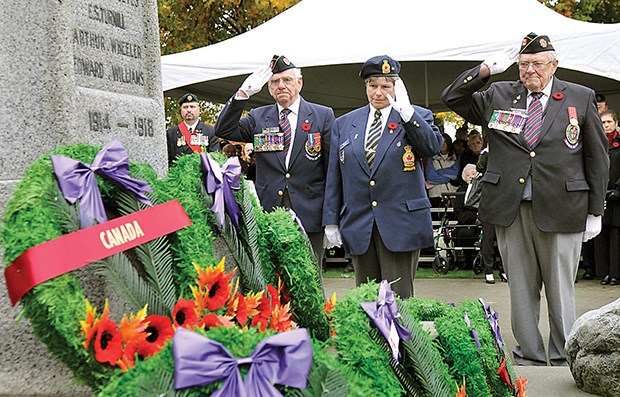The first 11 days of November tend to be consumed with all things Remembrance here at the Richmond News.
Once the Halloween features are but a ghost of the past, and we’ve wrapped up the spooky season with a show of some particularly gruesome/clever costumes, we’re on to thinking of how best to mark Remembrance Day.
In today’s paper, you’ll read a moving feature about a group of high school students who went to Normandy to track down the grave of a Richmond soldier, only a few years older than themselves when killed. Our Flashback Friday features a story about a Richmond soldier who fought in the First World War. As well, we have interviews with this year’s Silver Cross mother and Honoured Veteran. On the actual day, Wednesday, we are running a powerful letter from a young soldier to his mother written in 1944, shared with us by his granddaughter.
I don’t question the need to dedicate this time and energy, not to mention editorial space, to honouring our past. In fact, it’s a ... well, pleasure isn’t the right word, but it’s rich with meaning as it affords time to stop and contemplate a dramatic time in our history. It takes me out of myself as I reflect on the reality of cold, scared soldiers in the trenches, bombed-out civilians, orphaned children, as well as moments of humanity and heroism.
I also think of the political and economic factors that gave rise to such momentous and disastrous events and the mindset that contributed to it — which brings me to the issue of wearing a poppy.
There has been a string of media reports about certain celebrities being lambasted for refusing to wear poppies in public. Hardly a celebrity, but I, too, feel a certain pressure to don the red symbol. Thankfully, I’m happy to do it as it helps me feel connected to a larger historic narrative. It evokes a sense of awe for what others have gone through and continue to go through as war continues to rage in certain parts of the world.
That said, I certainly respect others’ choice to not wear a poppy. For them, it may be seen as a glorification of war, an endorsement of a military response to political situations, a celebration of nationalism.
And they have a point.
The poppy emerged as a commemorative symbol after the First World War — a war that, it can be argued, was more about defending king and country than freedom and democracy. However, if we are going to view the poppy today as a symbol of liberation and free thought, then insisting on conformity seems ironic to say the least. In fact, if we aim to respect our vets, the last thing we should do is simplify the complex factors that lead to war and stifle critical thinking that challenges the symbol of the poppy.



